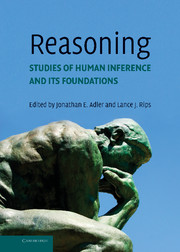14 - Patterns, Rules, and Inferences
Published online by Cambridge University Press: 05 June 2012
Summary
Introduction
Some of our reasoning is strictly deductive; we conclude that the available evidence supports a certain claim as a matter of logical necessity. For example, the following reasoning is deductive, since it is not possible for the conclusion to be false if both premises are true.
(1) Every F is G, and x is F. Therefore, x is G.
Often, however, we are not in a position to produce a deductive argument; often we can only establish that the evidence supports the conclusion to a high degree of probability. Such inductive reasoning, as it is normally called, is in turn divisible into two types, according to whether or not it presupposes that the universe or some relevant aspect of it is law-like, or rule-governed. Reasoning that does not require this presupposition may be classified as statistical, since the evidence described by the premises supports the conclusion for purely mathematical reasons. For example, the following inductive reasoning is statistical:
(2)
Almost every F is G, and x is F. Therefore, x is G.
Here it is rational to reach the conclusion even though it does not follow as a matter of logical necessity, for the probability of x's being G is, given the facts, much higher than the probability of x's not being G (other things being equal). The second type of inductive reasoning is generally classified as Humean, after the philosopher who first studied it thoroughly, and corresponds to those arguments that do require the presupposition of law-likeness.
Information
- Type
- Chapter
- Information
- ReasoningStudies of Human Inference and its Foundations, pp. 282 - 290Publisher: Cambridge University PressPrint publication year: 2008
Accessibility standard: Unknown
Why this information is here
This section outlines the accessibility features of this content - including support for screen readers, full keyboard navigation and high-contrast display options. This may not be relevant for you.Accessibility Information
- 1
- Cited by
